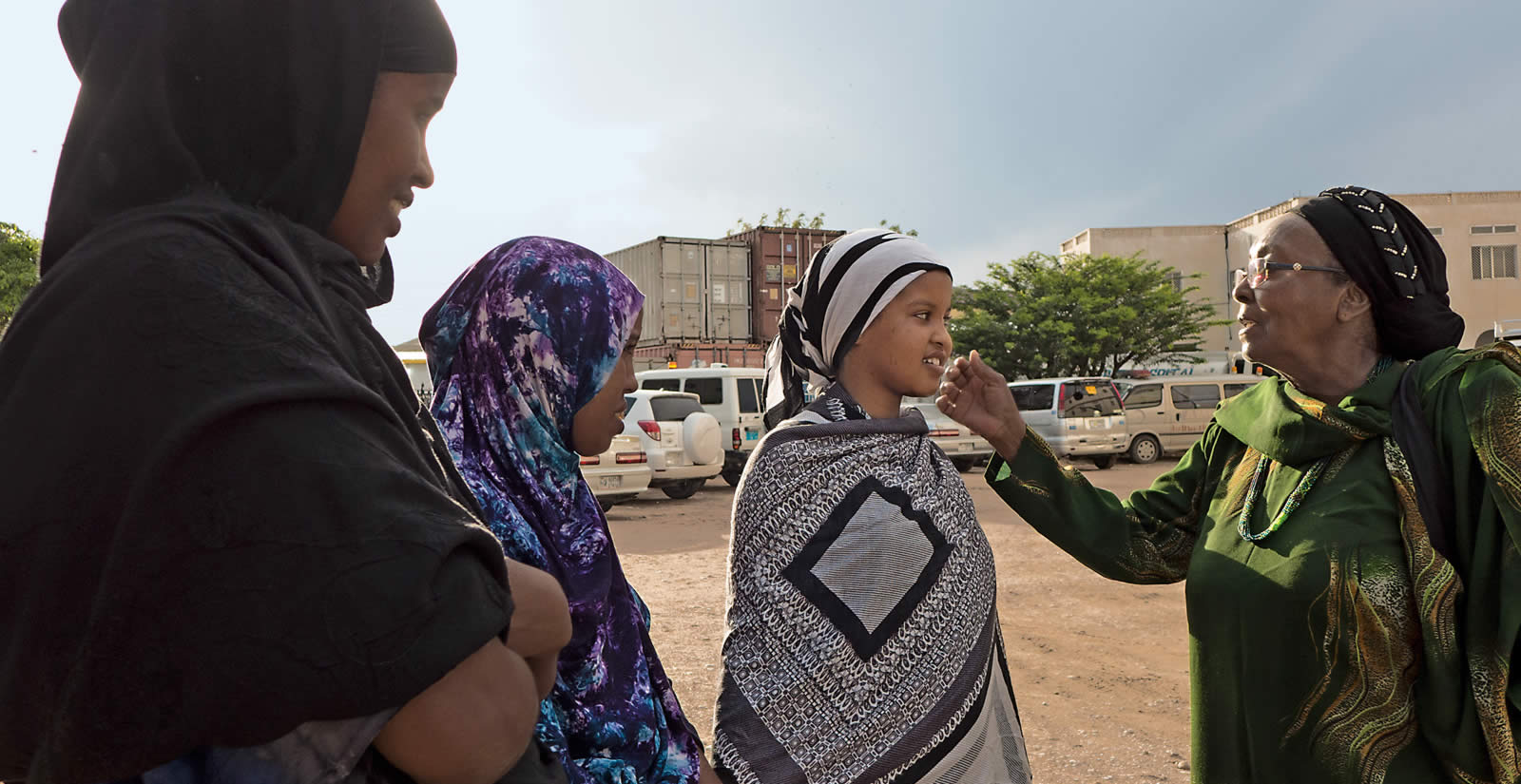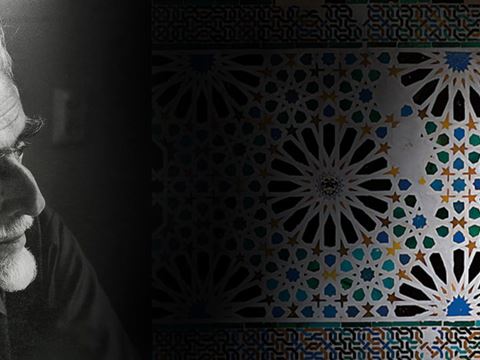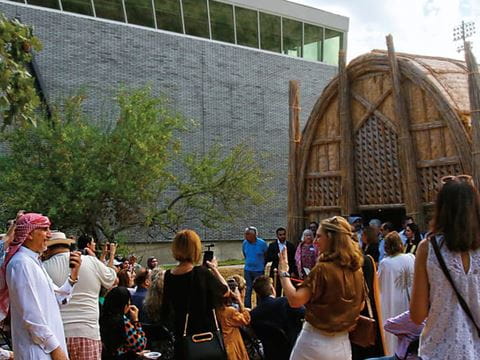
Training Somaliland's Next Generation of Caregivers: Identifying the Thesis and Supporting Arguments
Women Studies
East Africa
Conduct a close reading of Somalian pioneer midwife, educator and public health figure to identify evidence for a thesis.
The following activities and abridged text build off "Somaliland’s Midwife," written by Louis Werner and photographed by Lorraine Chittock.
WARM UP
Scan the article’s photos and captions to predict its theme and main idea.
IF YOU ONLY HAVE 15 MINUTES ...
Summarize the article, and identify its thesis.
IF YOU ONLY HAVE 30 MINUTES ...
Look for evidence ithat supports the thesis to see how a writer creates a persuasive argument.
VISUAL ANALYSIS
Examine a photograph of a person and explore what the photo reveals about the its subject and the photographer's intention.
Directions: As you read, you will notice certain words are highlighted. See if you can figure out what these words mean based on the context. Then click the word to see if you’re right.
Somaliland’s Midwife
Nearly three decades ago, civil war devastated the Horn of Africa’s northern flank. In Hargeisa, capital of the autonomous Republic of Somaliland, recovery continues, and among those leading the way are more than a few outstanding women.

Somaliland was formerly the British Somaliland Protectorate. Five days after becoming independent, in 1960, it joined its southern neighbor, then the Italian Trust Territory of Somaliland. Together, they formed the Republic of Somalia, with its capital in Mogadishu. In 1991 Somaliland broke away. Despite the war that followed, it has remained separate ever since.
One woman who has had an outsize influence on this new country is Edna Adan. Now 80 years old, Adan has, during her long life, been a midwife, educator, and public-health pioneer.
Adan works full time in the maternity hospital and nursing school that carries her name (Edna Adan Hospital). Her 12-hour day starts early in Somaliland’s countryside as she interviews candidates for the school’s incoming class. Construction on the hospital began in the late 1990s, and it opened in 2002 with 25 beds. Even before that, Adan was already training scores of nurses and lab technicians.

Adan’s public service career includes 30 years with the World Health Organization (WHO). She has also held government posts as both foreign minister and minister of family welfare and social development. Nonetheless, she modestly calls herself “the guinea pig of my generation,” as if to show that she has merely passed a test to prove a woman can succeed in a public role.
Question: Summarize the accomplishments of Edna Adan.
She started a maternity hospital and nursing school. She trained scores of nurses and lab technicians. She served with the World Health Organization, held government posts as foreign minister and minister of family welfare and social development.
“My lesson to others is do not be afraid to do anything, keep at it,” she says, “because if it works for one of us, it will work for all of us. I am not disrespectful of male leadership. Rather, I want to be helpful to them so they will come to me convinced that I am right.”
Adan was profiled by journalists Nicholas Kristof and Sheryl WuDunn in their 2009 book, Half the Sky. She was also featured in a 2012 documentary about extraordinary women around the world leading the charge to a better future for all.
Adan is the daughter of a Hargeisa doctor, At the young age of 11, she was determined to pursue a medical career. She trained first as a midwife in London in the 1950s. She then returned to her homeland and became its first professional nurse-midwife.

Her family did not escape the impact of the civil war, which started in 1991. This inspired her to create something for the country. “My father’s house, the house where I was raised, was destroyed,” she says. “Building this new hospital became my way of healing after so much heartbreak.”
Now, on a typical busy day, Somali colleagues are joined by volunteers from neighboring countries such as Djibouti, Kenya and Ethiopia. There may also be people from Denmark, the United Kingdom and the United States. The day might bring a complex surgery, a routine delivery, a rare lab specimen—or more.
Question: Describe some of the medical procedures performed at the Edna Adan Hospital.
Complex surgery, routine (baby) delivery, rare lab specimen.
The needs are great. The hospital’s website notes that Somaliland’s overall public health ranks among the lowest in the world. In large part, this is because of the civil war. Many of the country’s health care professionals were killed or left the country. Since then, much has been accomplished: Maternal mortality has fallen from 1,600 per 100,000 live births before the civil war to around 400 per 100,000, though this is still nearly double the global average, according to the United Nations.
Question: Somaliland overall public health ranks among the lowest in the world, due in large part to the civil war. How has the country improved its maternal mortality record?
Maternal mortality has fallen from 1,600 per 100,000 live births to 400 per 100,000.
Adan looks to her own life to counsel midwifery recruits as well as their parents. She recounts a mother who came to her distressed over her daughter’s desire to study nursing in England. The mother was fearful that the young woman would inevitably come home in shame. “I had to convince her that, no, it is not shame; it is a great honor,” she says. “And now that same woman says, ‘I want my daughter to be like you.’”

Among the 1,500 nursing, midwifery, and lab-technician students Adan has trained, two in particular stand out. The hospital’s chief doctor, Shukri Mohamed Taher, and midwife leader Khadan Abdilahe of the Somaliland Family Health Association. Taher was trained as a nurse. She graduated from medical school and then returned to the hospital. She has performed several of Somaliland’s first-ever pediatric procedures.
“I was 15 years old when I applied to Edna,” Taher says. “I had to lie that I was 18 in order to qualify for admission. I remember being asked in the interview what I would do if a patient vomited on me. I answered, ‘I would clean it up and keep talking to her.’”
More than half of the clinical residents at the hospital are women, Taher says. When husbands of patients and female relatives think a female doctor might not do something right, she offers professional reassurance: “I say, ‘I’ve done this 1,000 times already.’ My mother is not surprised by my success, but she is surprised that I’m doing even more than she expected of me.”
Like Taher, Abdilahe also credits Adan with guidance that has strengthened her own will.
“I was born after the civil war,” she says, “so I didn’t see that madness, but my father suffered a stroke, and my mother almost died in childbirth with a younger sibling. I could not help either one because I knew nothing. So that is why I became a nurse.
“I took my exam five days after an appendectomy, and my teachers told me to rest in bed, take the exam the next year, but nothing could stop me. Even when I fainted on the last day and could not complete it, they let me pass because everything I had written on the first day was perfect.”
Abdilahe admits she and her colleagues often find themselves fighting combinations of misinformation and superstition.

For example, many expectant mothers do not understand the benefits of a prenatal diet, she says. “But they feed their goats spinach, so I said, ‘You should eat spinach too.’ Once I had to attend a difficult home birth of a boy whose mother was reluctant to come to the clinic, even though we begged her for the baby’s sake. Now little Abdulrahman is one year old and healthy, and I am happy to say that she brings him for routine checkups without question.”
Adan is given credit for training the country’s first generation of female doctors and midwives. The younger generation is no less motivated. Two of those are currently Adan’s second year nursing students. As a young girl, Hoodo Nuur Ismaa’il helped her grandmother attend to the healthy birth of her aunt’s first child. Another student, Hamda Jama Ali watched a neighbor almost die when no one could assist her delivery. Both will soon attend a birth for the first time as midwives-in-training.
Question: Provide two examples of how Somaliland’s younger generation were motivated to become healthcare professionals.
One helped her grandmother attend to the healthy birth of her aunt’s first child. The other watched as a neighbor almost died when no one could assist her delivery.
“I want to see that happy moment when everyone is relieved, the baby is healthy, the mother is tired, and all of us are together helping,” says Ali. That attitude, Adan might say, is reward enough for her lifetime of trying to improve Somali health care.
Other lessons

MC Escher’s “Extra-logical Realities”: Artistic Progression From Architecture to Mathematics
Art
History
Europe
Create a simple tessellation integrating techniques by Dutch artist M. C. Escher that relies on Islamic-inspired patterns.
Building a Mudhif: Overcoming Challenges to Achieve Sustainable Architecture
Architecture
Environmental Studies
History
Americas
Levant
Read how a community overcame challenges to replicate a traditional reed structure dating back 5,000 years..jpg?cx=0.31&cy=0.53&cw=480&ch=360)
Building Bridges in the Classroom: The Stari Most Story for Teaching Writing and Cultural History
For the Teacher's Desk
Teach students how to uncover details through metaphor telling the story of their communities.